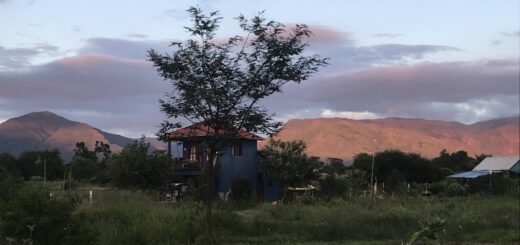Visiting the Octo-Man in Argentina’s Gaucho-land
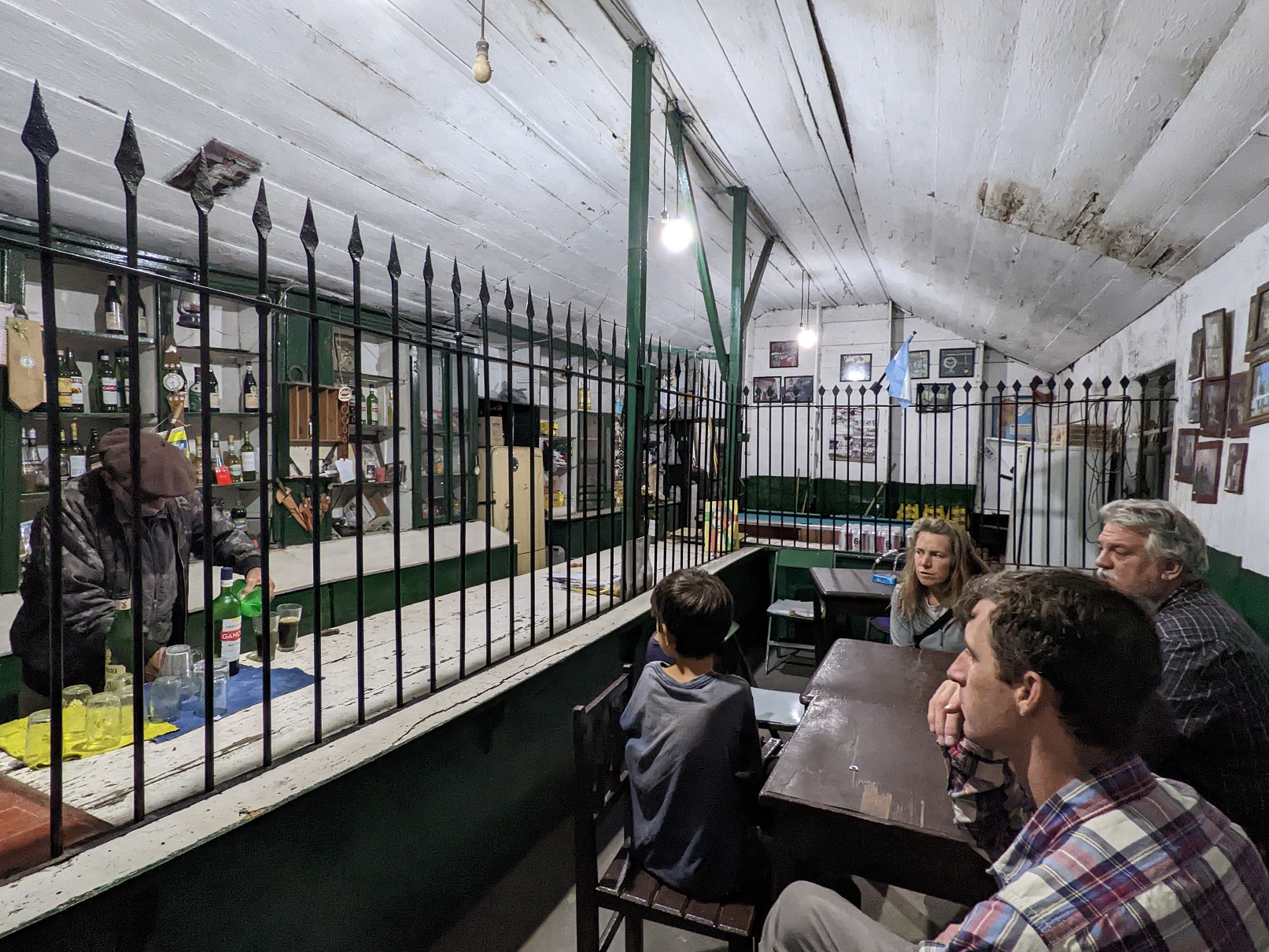
We make a late-night grub run to a 200-year-old historic establishment.
Let’s Eat Out Tonight
It’s 9:00 pm. We have just finished a long, grueling day of labor in the garden at Quinta Esencia, a permaculture farm and nature education center in the Pampas (grasslands) of Argentina. Temperatures topped 95 degrees Fahrenheit, so we rested during heat of the day and worked well into the dusk hours to take advantage of the breezy cool that settles over flatlands once the sun sets.
Now is usually when our boys are tucked into bed, asleep. Instead, we pile into the back of our host Pablo’s SUV and trundle out the gate, bumping along three kilometers of dirt road to the pulpería. Pablo has looked out over the horizon from the house we share with him and another volunteer and ascertained by the distant light shining that, yes, it is open.
Nobody had the energy to cook dinner today, so instead we head to the only food service place within many kilometers here in the heart of gaucho-land to partake of the sole offerings of this venerable establishment: picadas (at this point I don’t know what this is, but it sounds intriguing), soft drinks, and liquor.
A La Pulpería
In the light of a nearly-full moon, we pass a grey mare and her foal, who get onto their knobby legs and walk away from our rumbling vehicle. The foal, also grey, looks over at us, questioningly. It looks magical in the silver moonlight.
We pull up to an adobe building with a wooden sign in front reading “Esquina de Argúas 1817.” This establishment has been around for over 200 years. It was, as we learn, the place where the settler cowboys of yore (gauchos, they call them) came after a day of herding to play their guitars, swap gossip, and get a drink. Back then, pulperias were also general stores, clothing suppliers, hotels, post offices, and basically the social hubs of the Pampas, still sparsely populated by Spanish settlers in the early 19th century.
Pulpa means octopus in Spanish. When we first heard mention of a pulpería, we assumed it was somewhere to buy seafood. But no, the reason it is thus called is because the proprietor of the store did so much. He serviced horses, put up travelers, served food and drinks, fulfilled supply orders from local settler families, and more. So many were his tasks that it appeared he had arms all over the place. Hence, pulpería. The place of el pulpero, the octo-man.
In We Go
We open the swinging wooden doors and find ourselves in one small part of a barn of a building. Lining the back wall are shelves of various liquors. A counter topped with a high wrought-iron fence separates the area we are standing from the back area, where the octo-man moves about. Each vertical iron stake in the fence is tipped with a pointed metal arrow. It’s like the 19th-century version of a corner store’s bullet-proof shield. Ani, the other volunteer, is amazed. “What was the danger?” we ask Pablo.
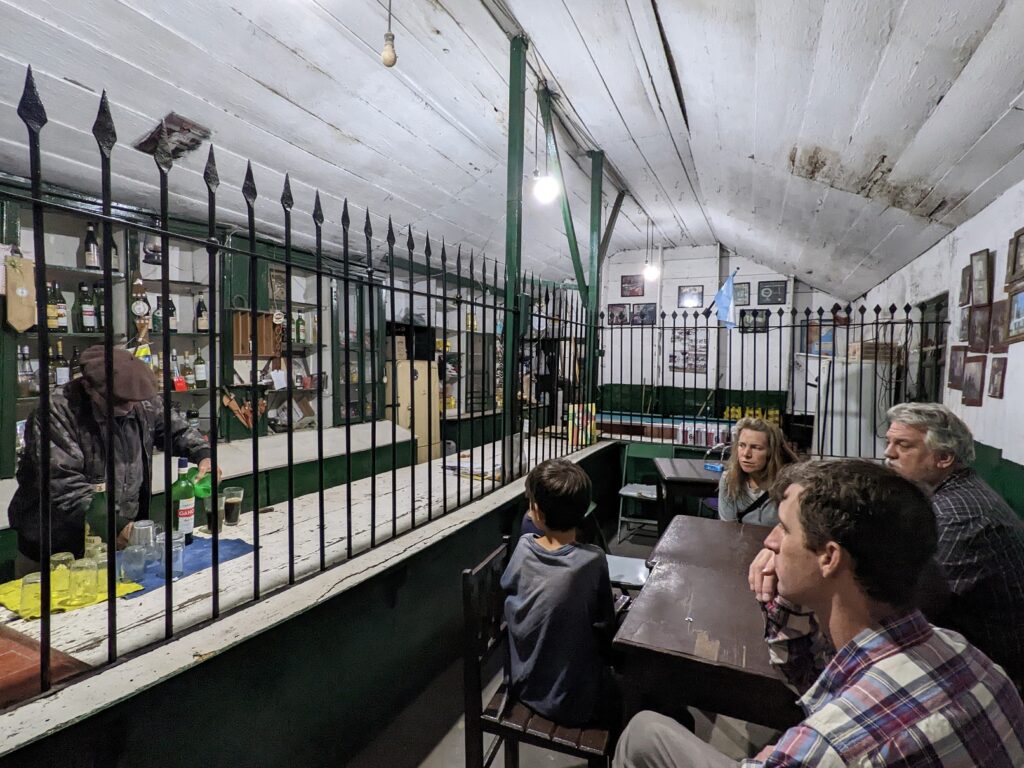
“Indios,” he replies. The barrier is to protect against the native folks who were already living here, whom the settlers displaced. Attacks and fighting were common in the early years of the land’s colonization.
A stooped old man wearing a leather jacket over a puffer vest and button up shirt walks out from a back room. He wears the typical beret-hat of the gauchos and enormous black sunglasses. If the Godfather had a country grandfather, this might be him. El pulpero’s appearance is off-putting because 1) the sun has set long ago and 2) it was just 95 degrees a few hours ago. As we watch the old man shuffle over, Oliver looks at me. “I feel like we’re about to die,” he says.
This man, ladies and gentleman, is Hermoso Villariño, age, 84 years, pulpero extraordinaire. He lives alone at the pulpería, attending to the dwindling numbers of visitors to his establishment, waking up at five in the morning to take care of the sheep, cows, horses, chickens, ducks and geese.
We take a seat around two of the three wooden tables in the customer area. Señor Villariño serves Matt and Pablo some kind of mixed drink made of 7-Up and hard liquor. The rest of us drink “soda,” i.e. carbonated water. Then Pablo orders picadas, which turns out to be bread, cheese, salami, and mortadella (baloney with olives).
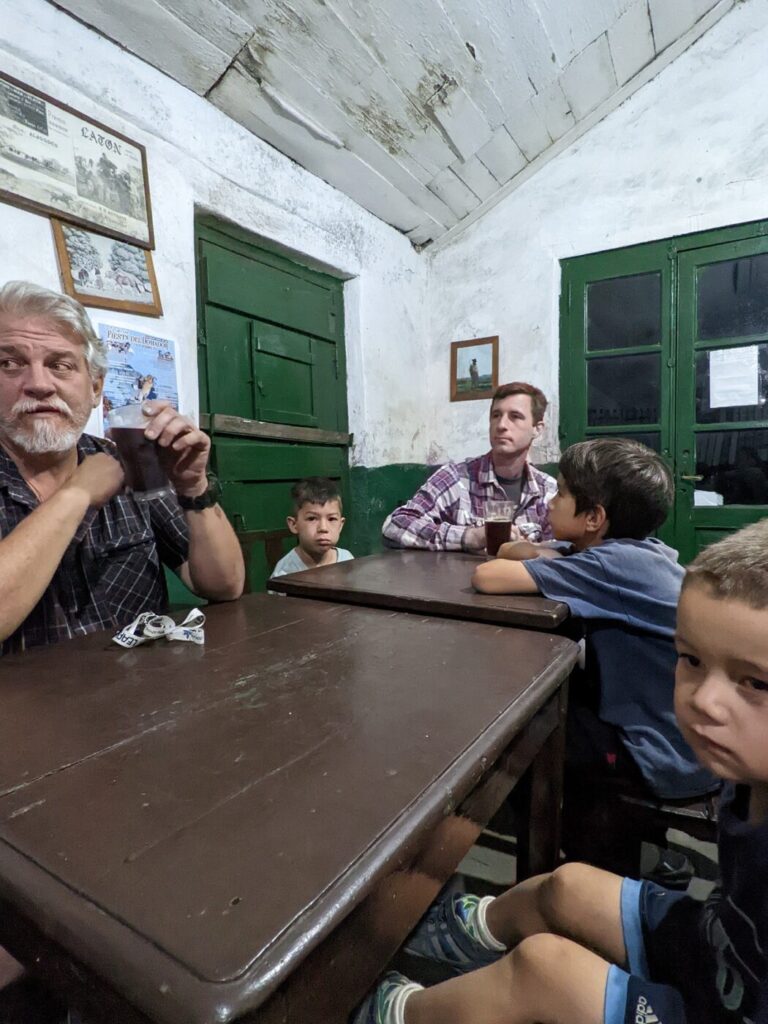
Life at the Pulpería
We fall on the food, all famished from a day of hard work and a late dinner. As we eat, we ask questions to Pablo and Señor Villariño, learning more about the pulpería. Like all the buildings this far away from the nearest town, Coronel Vidal, it is not connected to the electrical grid. When the sun sets, and when he feels like opening up, Señor Villariño starts up the gas generator to turn on the lights in the building. Today, he hasn’t had any other customers. It’s good we came, Pablo says, because it pays for the gasoline to power the generator.
In any given day, says Señor Villariño, maybe three or four people will come. Sometimes ten or 14 or even 20 will come. By now, el pulpero has taken off his dark glasses, and we see that he has a lively, wizened demeanor and a white moustache with the corners curled up. I have to strain to understand his Spanish. He sits on a chair on the other side of the metal barrier and watches us eat.
Pool, Argentine-Style
After we finish, Pablo challenges Matt to a game of pool. The pool table sits on the other side of the iron barrier, in the zone of the pulpero. We have to exit the doors we came in and go around the side of the building to another door, which Señor Villariño unlocks for us. I guess if you gain his trust then he lets you in to play pool? By now, it’s nearly 10:30 pm. The boys yawn, but perk up to watch their dad play.
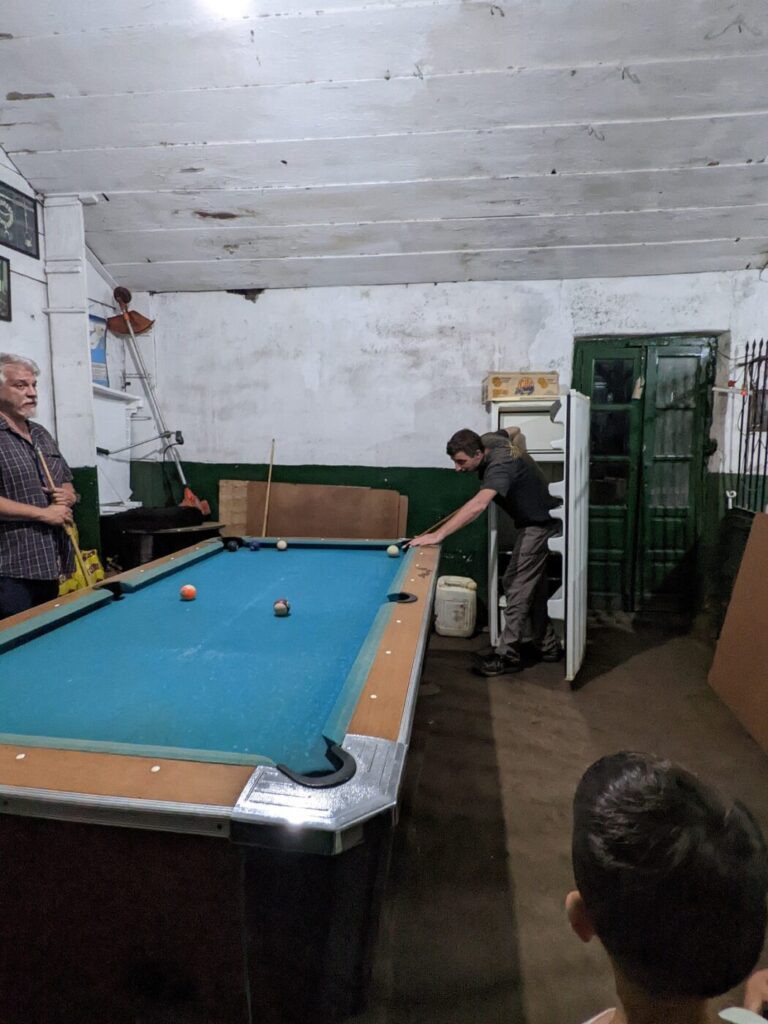
In one corner, you must open the defunct refrigerator to use your pool stick.
During the game, I walk to a back shelf with some dry goods for sale: noodles, tomato sauce, cooking oil, orange drink powder, boxed milk, canned olives, crackers, and, surprisingly, a small selection of organic snacks by the name brand Zafrán. Maybe this is for the visitors that come over from Quinta Esencia, a bit of a hippie oasis in the middle of the industrial agriculture that has taken over gaucho-land.
Señor Villariño keeps his post on the chair as the pool game progresses, offering advice on how to hit the ball in the final challenge, called fantasía. In the Argentine version of pool, you have to bounce the cue ball or eight-ball twice against the edges of the pool table before the eight-ball can go into a hole and give you a legitimate win. Matt loses to Pablo, after a valiant effort.
Filled up on cold cuts, bread, and liquor, we bid adieu to Señor Villariño, who invites us back the next Saturday for a year-end celebration, where they will slaughter and cook a sheep.
“Experiencia única,” says Ani (unique experience). We all feel we have walked out of a place frozen in time. It’s 11 p.m. “Each night,” I say sleepily to Pablo, “we eat dinner later and later.”
He replies, “You are becoming true Argentines.”





